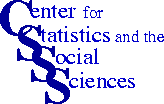

Over the last decade, great strides have been made in understanding the biological and social evolution of a particular hyper-social organism-Homo sapiens. The advances are, to no small extent, the result of the development of mathematical models of social evolution. This course reviews the state of the art in these models and how they have been leveraged for understanding the biosocial evolution of our species.
Objectives: Students will learn to develop and analyze mathematical models of social evolution, and apply the models as an aid to understanding the development of human (and other animal) social systems.
Tuesday and Thursday at 3:30 pm-4:50 pm in Denny (DEN) 449.
Office hours: I am typically available after class for office hours. Other times can be arranged. Call (3-7586) or email (djholman@u.washington.edu) me with questions or to set up an appointment.
The textbooks are
There may be some additional readings and handouts that will supplement the text books. These are available from the course web page.
There will be 5 problem sets (8% each) that will make up 40% of your final grade, and a final research project (60%). There are no midterm exams and no final exam.
The problem sets will consist of analytical exercises and other short problems. You can use books, readings, notes and web pages to help you work on the problems. In fact, you can work in groups on most exercises. Grades for late problem sets are reduced by 10% per day, including any fraction of a day late.
60% of your course grade will be based on a final research project in the form of a completed paper or poster with original research, analysis, and presentation using the methods covered in this course. A one page description of your project will be due during week 8. Projects can be a new or modified social evolutionary model applied to some human system. For example, you may use the methods covered in this course to analyze the evolution of human institutions like religion, government, unions, farm cooperatives or crime gangs. Or you may develop a new (or modify an existing) model to analyze a real-world example of animal social behavior. Alternatively, you may develop a purely theoretical model of social evolution. You may pick an existing model and extend it to a new, hypothetical, scenario, and do the analysis.
Projects can be done as a paper or as an academic poster. The project should include a brief review of the topic, a description of the model, analysis using the model, and a discussion of the results. You are not required to collect and analyze original data for the project, but you can do so to test your ideas.
Projects can be done in teams of two or three. Naturally, there are higher expectations for a team project.
Week 1: Introduction to social evolutionary models (Apr 1, 3)
Reading: Chapter 1 M&B; Chapter 1 S&W Overheads (Apr 1) Overheads (Apr 3) Assignments: Problem set 1 assigned (Thursday)
Week 2: Animal Conflict (Apr 8, 10)
Reading: Chapter 2 M&B Overheads (Apr 8) Overheads (Apr 10) Assignments: Problem set 1 due and Problem set 2 distributed (Thursday)
Week 3: Altruism and Inclusive Fitness (Apr 15, 17)
Reading: Chapter 3 M&B, Chapter 1 & 2 of B&G Radiolab: One Good Deed Deserves Another Overheads (Apr 15) Overheads (Apr 17) Assignments: Problem set 2 due, and Problem set 3 distributed (Thursday)
Week 4: Reciprocity (Apr 22, 24)
Reading: Chapter 4 M&B; Chapter 3 B&G Overheads (Apr 22) Overheads (Apr 24)
Week 5: Animal Communications (Apr 29, May 1)
Reading: Chapter 5 M&B Overheads (Apr 29) Overheads (May 1) Assignments: Problem set 3 due, and Problem set 4 distributed (Thursday) Data set (.dat) for problem set 4 Data set (.txt) for problem set 4 Data set (.xls) for problem set 4
Week 6: Selection Among Groups (May 6, May 8)
Reading: Chapter 6 M&B; Chapter 2 S&W Overheads (May 6) Assignments: Problem set 4 due
Week 7: More Group Selection (May 13, May 15)
Reading: Chapter 4 B&G; Chapter 3, 4 S&W Overheads (May 13) Overheads (May 15)
Week 8: The Evolution of Human Cooperation I (May 20, 22)
Reading: B&G Chapter 5, 6, 7; S&W Chapter 5 Overheads (May 20) Overheads (May 22) Assignments: One paragraph project description due (Thursday) Assignments: Problem set 5 distributed (Thursday)
Week 9: The Evolution of Human Cooperation II (May 27, 29)
Reading: B&G Chapter 5, 6, 7; S&W Chapter 5 Overheads (May 27) Overheads (May 29) Assignments: Problem set 5 due (Thursday). Week 10 Conclusions and elaborations (J
Week 10: Conclusions and elaborations (Jun 3, No class Jun 5)
Reading: B&G Chapter 12 Overheads (Jun 3)
Final Project Due: 12 June 2014 at 4:30 pm